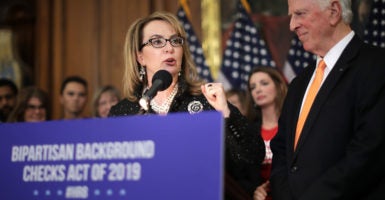The Democrat-controlled House is expected to vote this week on two gun control bills, one of which would subject gun sales by licensed dealers to federal review while the other would impose a universal background check on gun owners.
Last week, the House Judiciary Committee passed both measures on a 23-15 vote along party lines.
In a public statement, the National Rifle Association said the measures would not cut off criminals’ access to firearms and instead would inconvenience law-abiding citizens.
Reps. Mike Thompson, D-Calif., and Pete King, R-N.Y., are spearheading what some call the most high-profile action on gun control in two decades. Neither is a member of the Judiciary Committee.
Titled the Bipartisan Background Checks Act, one of the bills targets firearms purchased online or at gun shows, requiring these purchases to be subject to the federal background check system.
The legislation would amend current law that mandates only licensed firearms dealers must perform background checks before approving a gun sale. The amendment would require all gun transfers go through licensed firearm dealers to run background checks.
Gifts between family members and temporary transfers for use at a shooting range and hunting would be exempt from a background check.
The bill isn’t as bipartisan as its title suggests, with only four Republicans co-sponsoring the measure besides King: Brian Fitzpatrick of Pennsylvania, Brian Mast of Florida, Fred Upton of Michigan, and Chris Smith of New Jersey.
The other bill, sponsored by House Majority Whip James Clyburn, D-S.C., would extend the review period for a gun sale for up to 20 days. It is co-sponsored by King and Rep. Joe Cunningham, D-S.C.
Under the proposed Enhanced Background Checks Act, gun owners no longer would be able to bypass a background check if it isn’t completed within three days.
The review period would be extended to 10 days and the bill would allow the buyer to request a review if the check hasn’t been completed by then. If another 10 days goes by without notification from the background check system, the gun sale could advance.
House Democrats said the three-day safety valve allowed a gunman to fatally shoot nine persons at a Bible study inside Emanuel African Methodist Episcopal Church in Charleston, South Carolina, in June 2015.
Proponents of the bill cite that time period as the central justification to enhance communications between local law enforcement and the federal background check system. The gunman was able to buy a gun despite pending felony drug charges against him.
The National Rifle Association countered the notion that the three-day waiting period led to the Charleston shooting, noting that the shooter’s attempt to purchase the firearm on April 11, 2015, was delayed because of his arrest for drug possession.
However, the NRA also said the firearm “was transferred to him five days later, absent a direct proceed order from the National Instant Background Check System,” adding:
The attack did not occur until June 17. In the intervening time, the FBI had the opportunity to continue to investigate whether the perpetrator was prohibited from possessing firearms and could have referred the case to ATF [the Bureau of Alcohol, Tobacco, Firearms and Explosives] for a firearm retrieval had they determined he was indeed prohibited.
The NRA concludes that due to the FBI’s failure to continue an investigation on the gun transfer, lawmakers’ attempt to connect the Charleston shooting to the three-day waiting period is false.
































